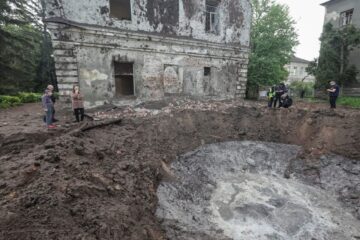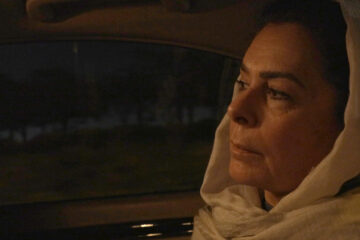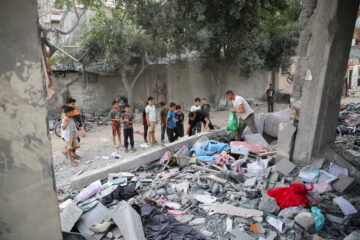Rebels claim mass turnout in east Ukraine vote for self-rule
The authorities in Kiev called the process a "criminal farce" that had no legal or constitutional validity.
Pro-Russian rebels have claimed a massive turnout in a vote for self-rule they held in two regions of eastern Ukraine amid fears it could lead to civil war.
With voting carried out Donetsk and Lugansk, one separatist leader said on Sunday the region would form its own state bodies and military after the referendum, formalising a split with Kiev that began with the armed takeover of state buildings in a dozen eastern towns last month, Reuters news agency reported.
Thousands of people queued in front of a limited number of polling stations in the restive provinces of Donetsk and Lugansk to cast their ballots, AFP journalists in several towns reported on Sunday.
The head of the self-proclaimed Donetsk People\’s Republic election commission Roman Lyagin told journalists that 89% voted in favour of self-rule, with 10% against, on a turnout of nearly 75%.
There are no results from the Lugansk area so far.
A Donetsk separatist leader, Denis Pushilin, told one Russian news agency that once the results are announced, all Ukrainian military troops in the region would be considered "occupying forces".
The shooting incident, in which separatist officials said at least one person had been killed, took place in Krasnoarmiisk, west of Donetsk city, after armed men supporting the Kiev government closed down a polling station.
A photographer with AP news agency reported seeing two people lying motionless on the ground.
The ballot papers in Ukrainian and Russian ask one question: "Do you support the Act of State Self-rule of the Donetsk People\’s Republic/Luhansk People\’s Republic?"
A second round of voting is planned in a week\’s time, on joining Russia. Organisers also say they will boycott Ukraine\’s presidential elections on 25 May.
"I want to be independent from everyone," said ex-factory worker Nikolai Cherepin as he voted yes in the town of Mariupol, in Donetsk province. Yugoslavia broke up and they live well now".
Separatist leaders asserted that more than 70 percent of the electorate in the two regions, home to seven million of Ukraine\’s total population of 46 million, had voted.
However, there was no way to verify that assertion. No independent observers were monitoring the vote, which took place in the absence of any international support, even from Moscow which had called for its postponement.
No violent incidents were reported during polling, but tensions remained high amid an ongoing military operation ordered by Kiev against the rebels.
Early on Sunday, an isolated clash occurred on the outskirts of the flashpoint town of Slovyansk as fighters tried to recapture a TV tower, but polling in the centre was unaffected.
Interim Ukrainian President Oleksandr Turchynov has warned secession supporters that independence for the regions would be "a step into the abyss."
He has appealed to the rebels to join talks on greater autonomy in the east.
Sunday\’s ballots seek voter approval for establishing so-called sovereign people\’s republics in the Donetsk and Luhansk regions. The vote, organized on an ad hoc basis with no clear controls over ballot papers or voter lists, has been widely criticized in Kyiv and in Western capitals.
Separatist leaders claim the populations in Donetsk and Luhansk are demanding the immediate opportunity to vote on the region\’s future, despite questions about the legality of the ballots and recent polling showing 70 percent of locals opposed to secession.
While one separatist leader said the region would form its own state bodies and military after the referendum, formalizing a split that began with the armed takeover of state buildings in a dozen eastern towns last month.
Another said the vote would not change the region\’s status, but simply show that the East wanted to decide its own fate, whether in Ukraine, on its own or as part of Russia.
A senior Russian politician said on Sunday he had brought to Moscow a petition by residents of Moldova\’s Russian-speaking, breakaway region of Transdniestria that backs union with Russia.
Dmitry Rogozin\’s comments will likely rattle Moldova, a former Soviet republic which, like neighboring Ukraine, is seeking closer ties with Europe but faces stiff resistance from Moscow.
Transdniestria, which says it broke from Moldova in 1990, has long sought to join Russia and the West fears the narrow sliver of land on the Dniestr river will be Moscow\’s next target following its annexation of Ukraine\’s Crimea region in March and its support for pro-Russian separatists in eastern Ukraine.
Moscow said it has the right to protect its compatriots and Russian-speakers abroad but denies Western accusations that it is fomenting unrest in eastern Ukraine as a possible pretext for an intervention.
Ukraine\’s Crimea region was annexed by Russia in March after a similar vote.
Jen Psaki, a State Department spokeswoman, said late Saturday the U.S. will not recognize the results. She said the polls "violate international law and the territorial integrity of Ukraine."
Psaki said the U.S. is "disappointed" that Russia has not used its influence in the region to postpone the poll, despite Russian President Vladimir Putin\’s suggestion last week to delay the vote and his claim that Russian forces were pulling back from the Ukrainian border.
Instead, Psaki said, the U.S. does not have any indication the Russian military is moving away from the border. She said Russian state media continue to "strongly back" the referendums "with no mention of Putin\’s call for postponement."
Western leaders blame Moscow for encouraging the separatist movement. German Chancellor Angela Merkel and French President Francois Hollande said Saturday they would back new economic sanctions against Moscow if the ongoing unrest threatens Ukraine\’s May 25 presidential election.
On Friday, Putin visited Ukraine\’s Crimea peninsula for the first time since Moscow annexed the territory in March. The United States, which does not recognize the annexation, condemned Putin\’s visit. Ukraine\’s Foreign Ministry called it a "provocation."
Russia is estimated to have some 40,000 troops near the border, but has said it has no plans to cross into mainland Ukraine.
Moscow says the troops have been pulled back, but NATO says it has seen no sign of this.
The vote marks a deepening of the political crisis in Ukraine, which has pushed East-West relations to lows not seen since the Cold War.
Source: Agencies
[do_widget_area inner_adsbar]










